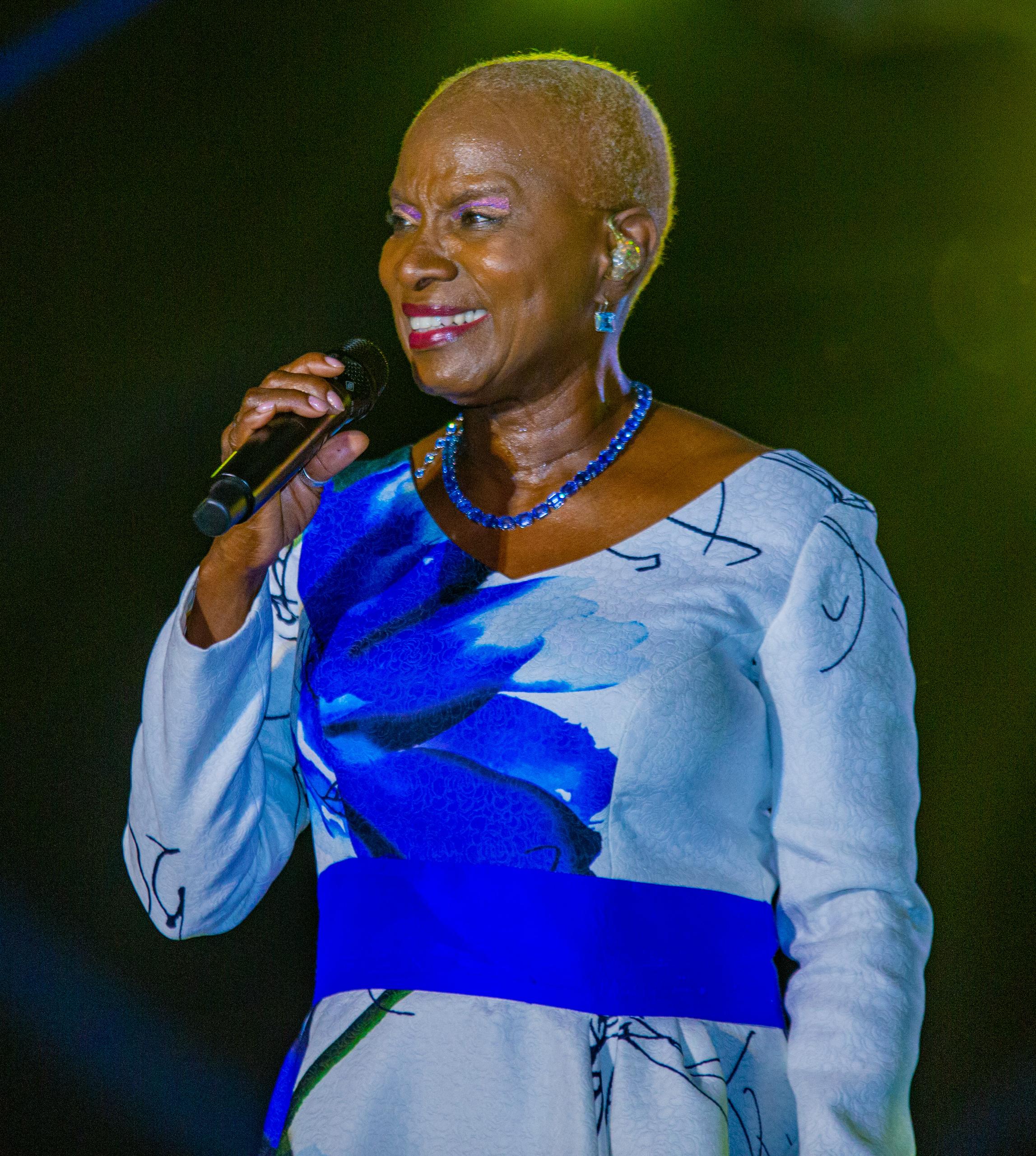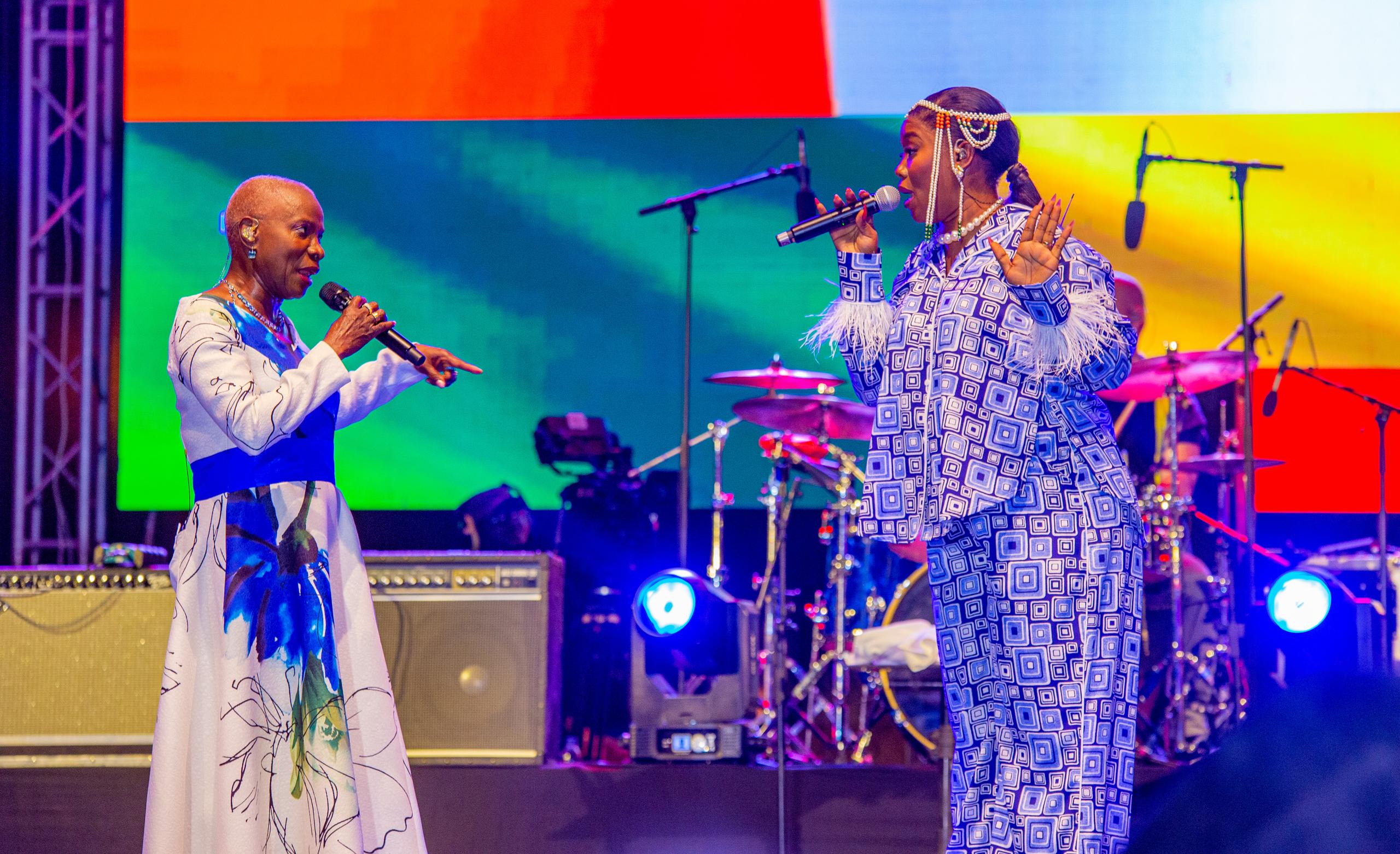A boy waved a big glove painted within the colors of the Ivorian flag at Angélique Kidjo as she carried out her track “Afrika.” This track evokes deep appreciation for the continent and highlights Africa’s attributes. The gang sang alongside, chanting, “Ashè é maman, ashè é maman Afirika.” Angélique dazzled in her robe adorned with blue and inexperienced floral designs, blue pearls ornamented her neck and ears. A diva; she moved gracefully, simply as energetically as she did within the earlier performances I had watched on-line, exhibiting no indicators of her age. Three years in the past, she delivered the identical track on the World Citizen live performance in Paris, showcasing the identical poise and flawless artistry that captivated the viewers.
The boy, like me, was watching Angélique carry out stay for the primary time in his life, nevertheless it was not the primary time I’d seen her.
The day earlier than, we have been sitting within the lodge lounge when the 64-year-old African music legend appeared earlier than us, rising out from a staircase main into the boardroom the place the press convention was being held. I used to be scheduled to fulfill together with her in 5 minutes. She appeared so easy and so human, as if she weren’t the Angélique Kidjo, who is taken into account by many to be the beacon of African music and who, for a lot of many years, has used her creativity and character to form some perceptions of Africa. In 2007, she was named “Africa’s premier diva” by Time.
She arrived in Abidjan, Côte d’Ivoire, to carry out on the seventeenth version of the Anoumabo City Music Pageant, recognized in French because the Pageant des Musiques Urbaines d’Anoumabo (FEMUA), an annual worldwide music pageant launched by the Magic System, an Ivorian music group led by Salif Traoré, popularly generally known as A’salfo, who was born in Anoumabo.
I joined Angélique Kidjo some minutes after she returned to the boardroom, taking speedy strides in her easy outfit, defying the toll the day had taken on her: She had woken up earlier than 6 a.m. to energise her physique within the fitness center. From there, it was one occasion to the opposite, and simply on that day, she spoke to about 10 journalists, every spending greater than quarter-hour, sitting down and answering questions as we every took turns within the boardroom. I used to be the final journalist to talk to her, however the tiredness by no means appeared on her face. I used to be fearful she wouldn’t have the power to carry a dialog, so I requested her, in Yoruba, as one of many many languages she’s fluent in, “Shey koti rera, ma?” Unfastened translation: Are you not drained within the physique, ma?
“Oh, I’m, however I’m used to it,” she instructed me. “Iwo nko?” She requested how I used to be feeling. I used to be superb and excited to talk to her, I mentioned.
“I began music fairly younger. The primary time I went on stage, I used to be 6 years previous. I really like singing, and that singing has been nurtured by my household. Each time I went on trip with my household in Lagos, there have been all the time songs. Each time I visited my father’s household, there was all the time music. I absorbed and discovered early and fairly quick.”
To many Nigerians, Angélique Kidjo exists nearly like a mystical legend. Nearly all of younger individuals, like me, have been launched to her correctly in 2020 when Burna Boy’s “African Large” was nominated for Finest World Music Album on the Grammys. Many Nigerians, in all probability resulting from their fanaticism or–to be a bit of bit excessive–superiority advanced, count on their faves to win any class they seem in. When Angélique Kidjo was introduced because the winner, marking her 4th Grammy Award, she devoted the award to Burna Boy, an emblem of the legend that she is, utilizing the second to nudge a way of pan-Africanism.
Picture Credit score: Tidiane Traore/FEMUA
Consuming quite a lot of numerous music from the African continent, alongside music from the likes of James Brown and Stevie Surprise, from a younger age impressed her to make acutely aware music. There after which, she realised she might go anyplace and sing, even when they didn’t perceive her language. She mentioned to herself, “I do know my music will take me in all places. And that’s what introduced me the place I’m in the present day.” There are not any phrases to explain how a lot Angélique has achieved, from albums to awards to performances in arenas, she has certainly achieved the dream of that 6-year-old woman.
Each FEMUA version since its launch in 2008 has all the time been themed. The seventeenth FEMUA is themed “Highway Security”, to create consciousness in direction of one of many causes of dying in Côte d’Ivoire. The day by day variety of deadly highway accidents within the nation has risen to 46, from simply 12 in 2012, in line with a 2023 United Nations report. The report additional says that “in Africa, site visitors deaths account for about one quarter of the worldwide variety of victims, despite the fact that the continent has barely 2 per cent of the world’s automobile fleet,” albeit the absence of correct knowledge documentation within the continent.
It was solely becoming for Angélique Kidjo, who has been concerned in a number of causes, to carry out on the FEMUA. Past her generational and genre-defying music, Angélique Kidjo has constructed a popularity as certainly one of Africa’s most vocal voices for social justice, ladies’ training and cultural pleasure. Via her Batonga Basis, she helps the training and empowerment of younger ladies in underserved communities throughout sub-Saharan Africa. As a UNICEF Goodwill Ambassador, she has persistently spoken out in opposition to little one exploitation, gender-based violence and well being crises like HIV/AIDS.
“One factor that we can not overlook is that our tradition comes from the transmission of storytelling. Your grandmother instructed tales to you, proper? That’s the place our energy is. Music is a robust device [for remembrance]. Each ceremony has a track to mark the second. Telling a narrative is a compelling factor, and FEMUA is a free occasion the place we are able to inform individuals to watch out once they drive. Music has that energy; it’s what I’ve used to deal with points my continent faces. This is the reason I’m glad to be right here this 12 months, not like different years when my calendar by no means allowed me.”
Her music, itself, has been a automobile for advocacy. Songs like “Batonga” and “Afrika” reaffirm African id and resist cultural erasure, whereas her Grammy-winning reinterpretation of Speaking Heads’ “Stay in Mild” tackles points like xenophobia and migration.
“Understanding the place you come from, being pleased with your personal tradition and the truth that you will have one thing to supply, that’s sufficient.”

Picture Credit score: Tidiane Traore/FEMUA
For many years, Angélique Kidjo has made songs that transcend and encourage generations. As an African lady, I requested her how proud she is of the most recent era of African girls taking music globally, contemplating the systemic discrimination that ladies face in each trade. She mirrored on some discrimination in her early phases. In France, “each time I opened my mouth, they’d say, “No, this isn’t African music. You assume every thing comes from Africa?” I imply, I’ve been by way of verbal abuse so many occasions, however I preserve [to] my purpose,” she mentioned.
“My first album, ‘Logozo,’ it was a nightmare earlier than we began the total [performing] session. A stylist instructed me, “Why do you want a stylist? In your nation, don’t you stroll bare?” I needed to exit and discover my very own outfit. It was the start for a second of reckoning that made me realise it wasn’t the primary time I’d face it. SobI’d higher be ready. I used to be like, sooner or later, I’m gonna show to you all. As a result of I do know the place I come from.”
Whereas Angélique Kidjo is pleased with the feminine African artists, she emphasised the ability of goal and dealing collectively. “It’s tougher for ladies as a result of extra male artists on the market, so work collectively. Solidarity is what has stored us by way of the years, so let’s proceed doing it.” Whereas performing, she introduced out Roseline Layo, a younger Ivorian feminine artist, to carry out their newly launched track, “On Sera Là.”

Picture Credit score: Tidiane Traore/FEMUA
One of many objectives of FEMUA is to introduce the Ivorian tradition to the world, by way of meals, dance and music. The presence of worldwide media permits the pageant to be a channel for cultural exportation and tourism promotion. I requested Angélique Kidjo if she thinks collaboration between African artists might assist in exporting the continent’s cultures.
“United, we’re unbreakable. Divided, we’d fail. And I need the younger era to know that. It’s not all the time about cash or flashy stuff; it’s about what we’re constructing and leaving for the approaching era. We’ve got to be purposeful about that, and the extra we collaborate, the extra we create a ripple impact,” mentioned Angélique Kidjo. Her 2021 album, Mom Nature, has quite a lot of collaborations with many younger African artists like Burna Boy, Yemi Alade, Mr Eazi, Sampa The Nice, and Shungudzo, amongst others.
The time was 7:20 pm, and she or he needed to be elsewhere. Because the dialog drew to a detailed, I requested her, What’s that recommendation she’d give to each African artist, younger or previous, on the market? It’s the identical factor she’s all the time reiterated. “The one factor that I’ve is the music of my ancestors, and I need the brand new era to be aware of how they carry themselves on the market as a result of these persons are all the time able to deceive us. I’ve constructed one thing as a result of I didn’t quit. Don’t quit on me.”







